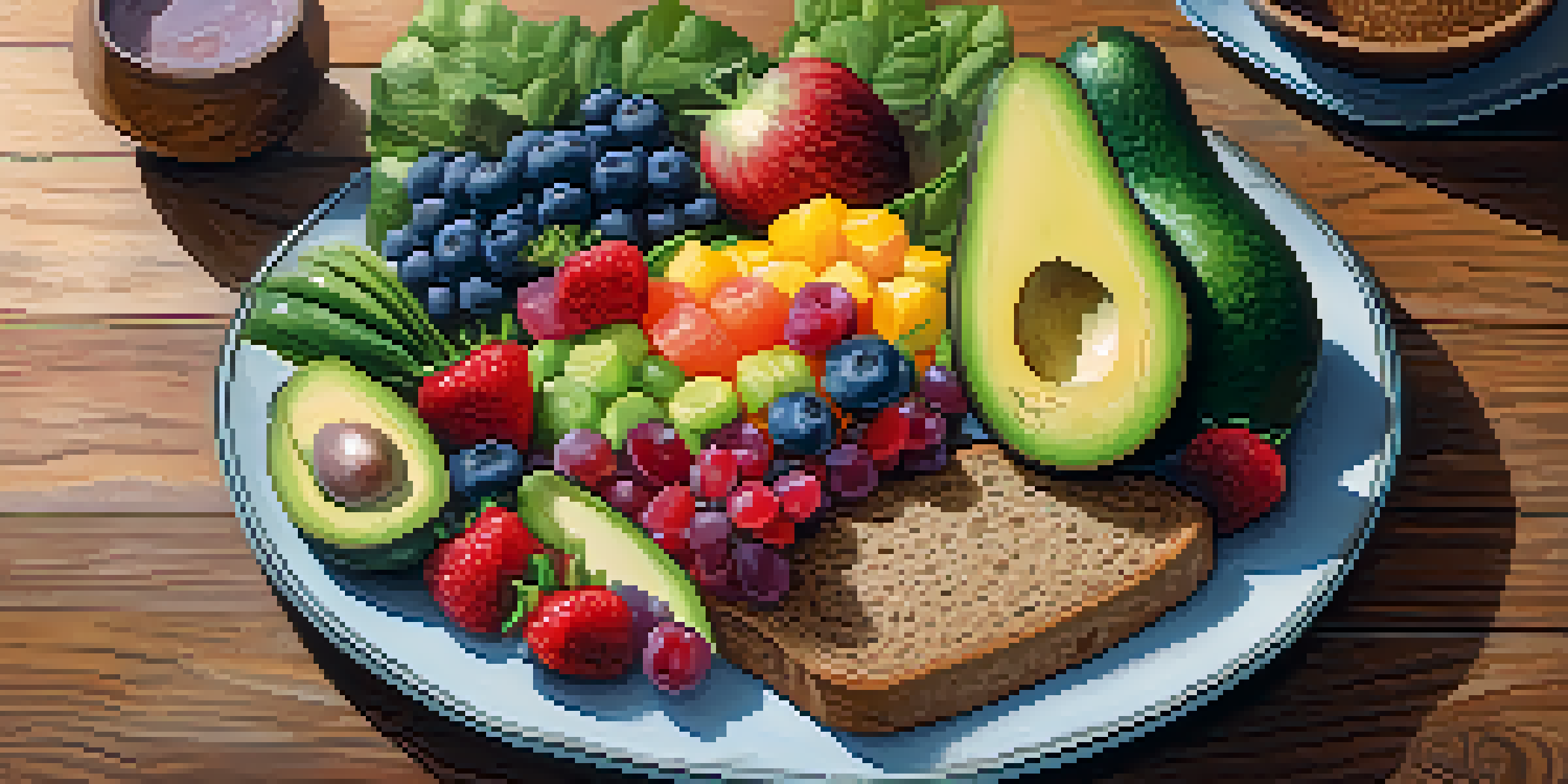Nutritional Myths: Separating Fact from Fiction

Myth: Carbs Are the Enemy of Weight Loss
Many people believe that cutting carbohydrates is the key to weight loss. However, carbohydrates are a vital source of energy for our bodies. Instead of completely eliminating carbs, focusing on whole grains, fruits, and vegetables can provide essential nutrients while still supporting weight management.
Let food be thy medicine and medicine be thy food.
Carbohydrates come in various forms, and not all are created equal. Simple carbs, like sugary snacks, can lead to weight gain, while complex carbs found in whole foods can help you feel full and satisfied. So, rather than fearing carbs, it's more beneficial to choose the right types.
Incorporating the right carbs into your diet can enhance your energy levels and overall well-being. Remember, it’s about balance and moderation, not deprivation.
Myth: Eating Fat Makes You Fat
The idea that eating fat leads to weight gain is one of the most persistent nutritional myths. In reality, fats are essential for many bodily functions, including hormone production and nutrient absorption. Healthy fats, like those found in avocados and nuts, can actually support weight loss when consumed in moderation.

The key is to differentiate between healthy fats and unhealthy ones. Saturated and trans fats can contribute to weight gain and health issues, while unsaturated fats can be beneficial. Incorporating sources of healthy fats into your meals can promote satiety and keep you feeling full longer.
Carbs Are Essential for Energy
Instead of cutting carbs entirely, focus on incorporating whole grains, fruits, and vegetables to support weight management.
So, instead of avoiding fats entirely, focus on integrating healthier options into your diet. This shift can improve your health without the stress of cutting out entire food groups.
Myth: All Calories Are Created Equal
While it’s true that weight management revolves around calories, not all calories impact your body in the same way. For instance, 100 calories from a sugary snack will affect your body differently than 100 calories from a nutritious meal. The nutrients in food play a significant role in how your body processes those calories.
You are what you eat.
Foods high in sugar or low in nutrients can lead to cravings and overeating, while whole foods are more filling and satisfying. This means that focusing solely on calorie counting may not be the most effective strategy for weight loss or healthy eating.
Understanding the quality of your calories is crucial. Prioritizing nutrient-dense foods can lead to better health outcomes, making it essential to look beyond the numbers.
Myth: Skipping Meals Helps with Weight Loss
Many believe that skipping meals will help shed pounds, but this approach can backfire. When you skip meals, your body might go into starvation mode, slowing down your metabolism and leading to overeating later on. Instead, regular, balanced meals can help maintain energy levels and prevent hunger pangs.
Eating smaller, more frequent meals can keep your metabolism active and help manage blood sugar levels. This strategy can lead to better weight management and overall health since you’re less likely to face intense cravings.
Quality of Calories Matters
Not all calories are equal; prioritizing nutrient-dense foods over empty calories can lead to better health outcomes.
Opting for nutritious snacks throughout the day, like fruits or nuts, can support your body's needs without the stress of meal deprivation. Remember, fueling your body regularly is key to long-term success.
Myth: Detox Diets Are Necessary for Health
Detox diets often promise quick fixes, but our bodies are naturally equipped to detoxify themselves. The liver, kidneys, and digestive system work tirelessly to eliminate toxins from our bodies. Therefore, relying on juices or extreme diets isn’t necessary and can sometimes be harmful.
Instead of jumping into a detox, focus on a balanced diet rich in fruits, vegetables, and whole grains. These foods can support your body's natural detoxification processes by providing essential nutrients and fiber.
Hydration also plays a vital role in detoxification. Drinking plenty of water daily can assist your body in flushing out toxins without the need for extreme measures.
Myth: Supplements Can Replace a Healthy Diet
While supplements can be beneficial in certain situations, they should not replace a healthy diet. Whole foods provide a complex array of nutrients, fiber, and beneficial compounds that supplements can't fully replicate. Relying solely on pills can lead to nutrient imbalances and may not address your overall health needs.
It's important to prioritize getting your nutrients from food first. Eating a variety of colorful fruits and vegetables, whole grains, and lean proteins can ensure you’re meeting your nutritional requirements.
Balance Over Deprivation
Regular, balanced meals and healthy snacks are more effective for weight management than skipping meals or extreme diets.
If you feel you need a boost, consider consulting a healthcare professional. They can help determine if supplements are necessary and guide you on the best sources of nutrients for your body.
Myth: Organic Foods Are Always Healthier
Organic foods have gained a reputation for being healthier, but it's essential to understand what 'organic' really means. Organic farming avoids synthetic pesticides and fertilizers, which can be beneficial for the environment, but it doesn't automatically guarantee that the food is more nutritious than conventionally grown options.
Nutritional value can vary greatly depending on how foods are grown, harvested, and prepared. Some organic foods may still be high in sugar or unhealthy fats, while certain conventional foods can be quite nutritious.

Ultimately, the best approach is to focus on whole, minimally processed foods, whether they're organic or not. Making informed choices based on nutritional content rather than labels can lead to a healthier diet.
Myth: Eating Late at Night Causes Weight Gain
The belief that eating late at night leads to weight gain is a common misconception. What truly matters is the total number of calories consumed throughout the day, rather than the timing of meals. If you consume a balanced diet and stay within your caloric needs, eating late won't necessarily cause weight gain.
However, late-night snacking can sometimes lead to poor food choices, as we may reach for convenience foods rather than nutritious options. Being mindful of what you eat at night can help maintain a balanced diet, regardless of the time.
Ultimately, it's about listening to your body's hunger cues. If you're genuinely hungry at night, opting for a healthy snack can satisfy your cravings without derailing your weight management goals.